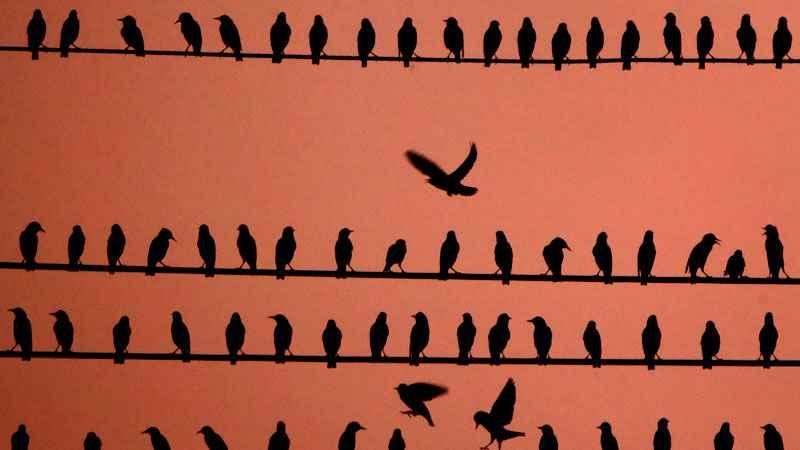Trump administration scales back wild bird protections

In this Sept. 24, 2017, file photo, birds vie for position on power lines at dusk in Kansas City, Kan.[AP Photo/Charlie Riedel, File]
The Trump administration on Tuesday finalized changes that weaken the government’s enforcement powers under a century-old law protecting most American wild bird species, brushing aside warnings that billions of birds could die as a result.
Federal wildlife officials have acknowledged the move could result in more deaths of birds that land in oil pits or collide with power lines or other structures.
A U.S. District Court judge in August had blocked the administration’s prior attempt to change how the Migratory Bird Treaty Act is enforced.
But urged on by industry groups, the Trump administration has remained adamant that the act has been wielded inappropriately for decades, to penalize companies and other entities that kill birds accidentally.
More than 1,000 species are covered under the migratory bird law, and the move to lessen enforcement standards have drawn a sharp backlash from organizations that advocate on behalf of an estimated 46 million U.S. birdwatchers.
Conservationists said Tuesday they would push President-elect Joe Biden to reverse the Interior Department rule, which blocks officials from bringing criminal charges unless birds are specifically targeted for death or injury.
A final EPA rollback under Trump curbs use of health studies
Former U.S. Fish and Wildlife Service Director Dan Ashe and independent scientists have said the change could cause a huge spike in bird deaths — potentially billions of birds in coming decades — at a time when species across North America already are in steep decline.
Industry sources kill an estimated 450 million to 1.1 billion birds annually, out of an overall 7.2 billion birds in North America, according to the U.S. Fish and Wildlife Service and recent studies. Many companies have sought to reduce bird deaths in recent decades by working in cooperation with wildlife officials, but the incentive to participate in such efforts drops absent the threat of criminal liability.
The 1918 migratory bird law came after many U.S. bird populations had been decimated by hunting and poaching — much of it for feathers for women’s hats.
The highest-profile enforcement case bought under the migratory bird act resulted in a $100 million settlement by BP, after the Gulf of Mexico oil spill in 2010 killed approximately 100,000 birds.
U.S. Fish and Wildlife officials said the latest proposal was meant to match up with a 2017 legal decision that effectively ended criminal enforcement under the act during most of Trump’s presidency. In the August court ruling that struck down that legal opinion, U.S. District Judge Valerie Caproni in New York said the law applies to all bird deaths, not just those that were intentional.
Over the decades, federal courts have been split on whether companies can be prosecuted under the migratory bird law, with appeals courts ruling in favor of industry three times and siding against companies twice.
Interior Secretary David Bernhardt said in a statement that the change finalized Tuesday "simply reaffirms the original meaning and intent of the Migratory Bird Treaty Act."
"The U.S. Fish and Wildlife Service will not prosecute landowners, industry and other individuals for accidentally killing a migratory bird," he said.
Noah Greenwald with the Center for Biological Diversity said Trump officials were giving oil companies and other industries "a license to kill birds."
"Vast numbers of birds will be electrocuted by power lines, drowned in oil waste pits and killed in other easily preventable ways," Greenwald said.